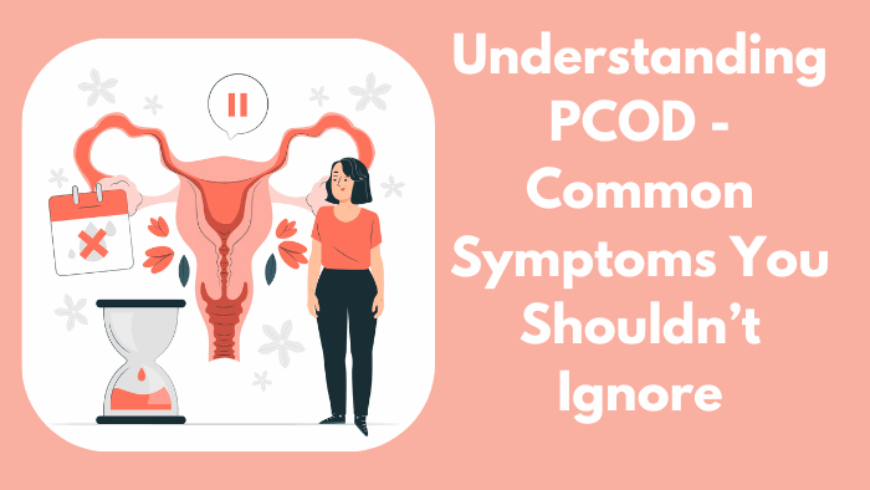Understanding PCOD – Common Symptoms You Shouldn’t Ignore
Polycystic Ovarian Disorder (PCOD) is one of the most common hormonal disorders affecting women of reproductive age. Despite its prevalence, many women remain unaware of the condition or dismiss its symptoms as normal bodily changes. Understanding PCOD and recognizing its symptoms early can help manage the condition effectively and prevent long-term health complications. In this blog, we’ll dive into what PCOD is, its common symptoms, and why you shouldn’t ignore them. If you’re in Hadapsar and looking for expert care, we’ll also recommend a trusted gynecologist to guide you through your health journey.
What is PCOD?
PCOD is a hormonal imbalance that affects the ovaries, the reproductive organs responsible for producing eggs and hormones like estrogen and progesterone. In PCOD, the ovaries may develop small cysts and produce higher-than-normal levels of androgens (male hormones). This imbalance can disrupt the menstrual cycle, affect fertility, and lead to a range of physical and emotional symptoms.
While the exact cause of PCOD is unknown, factors like genetics, insulin resistance, and lifestyle choices are believed to play a role. Early diagnosis and proper management are crucial to reducing the risk of complications such as diabetes, heart disease, and endometrial cancer.
Common Symptoms of PCOD You Shouldn’t Ignore
PCOD manifests differently in every woman, but there are some common symptoms that should never be overlooked. If you experience any of the following, it’s time to consult a gynecologist:
- Irregular Periods
One of the most telltale signs of PCOD is irregular menstrual cycles. This could mean having fewer than eight periods a year, unusually heavy bleeding, or prolonged cycles. Irregular periods occur because ovulation is disrupted due to hormonal imbalances. - Excessive Hair Growth (Hirsutism)
Elevated androgen levels can cause excessive hair growth on the face, chest, back, or other areas where men typically grow hair. This condition, known as hirsutism, can be distressing and is often a key indicator of PCOD. - Acne and Oily Skin
Hormonal fluctuations in PCOD can lead to persistent acne, especially along the jawline, chin, and back. Oily skin is also a common complaint among women with this condition. - Weight Gain or Difficulty Losing Weight
Many women with PCOD struggle with weight gain, particularly around the abdomen. Insulin resistance, a common feature of PCOD, makes it harder for the body to process sugars, leading to weight gain. - Hair Thinning or Hair Loss
While some women experience excessive hair growth, others may notice thinning hair or hair loss on the scalp, a condition known as female-pattern baldness. - Darkening of Skin
PCOD can cause dark, velvety patches of skin in areas like the neck, groin, and under the breasts. This is often a sign of insulin resistance. - Mood Swings and Fatigue
Hormonal imbalances can take a toll on your mental health, leading to mood swings, anxiety, depression, and chronic fatigue. - Difficulty Conceiving
PCOD is a leading cause of infertility in women. Irregular ovulation or the absence of ovulation makes it challenging to conceive naturally.
Why Early Diagnosis Matters
Ignoring the symptoms of PCOD can lead to serious health complications, including:
- Type 2 diabetes
- High blood pressure and cardiovascular disease
- Sleep apnea
- Endometrial cancer
- Mental health issues like depression and anxiety
Early diagnosis and intervention can help manage symptoms, regulate menstrual cycles, and improve overall quality of life. Lifestyle changes, medications, and expert guidance from a gynecologist can make a significant difference.
Seeking Help from a Trusted Gynecologist in Hadapsar
If you’re experiencing any of the symptoms mentioned above, it’s essential to consult a skilled gynecologist for a proper diagnosis and personalized treatment plan. In Hadapsar, Dr. Pallavi A. Mulay at Mulay Hospital is a highly recommended gynecologist with extensive experience in managing PCOD and other women’s health issues.
Dr. Mulay is known for her patient-centric approach, combining advanced medical treatments with compassionate care. Whether you’re dealing with irregular periods, fertility concerns, or other PCOD-related symptoms, Dr. Mulay can provide the guidance and support you need to take control of your health.
PCOD is a complex condition, but with the right knowledge and care, it can be managed effectively. Don’t ignore the symptoms—your body might be trying to tell you something important. If you’re in Hadapsar, reach out to Dr. Pallavi A. Mulay at Mulay Hospital, a trusted gynecologist in Hadapsar, to start your journey toward better health. Remember, early intervention is key to living a healthy, fulfilling life despite PCOD.
Take the first step today—your health is worth it!

